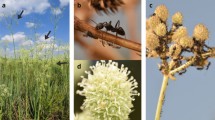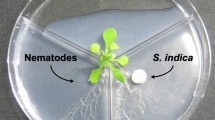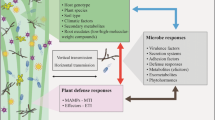Abstract
Many plants employ induced responses against generalist herbivores. Specialist herbivores, however, may employ several mechanisms to overcome the negative effects of induced plant defenses. Here we test how the behavior and development of specialist Manduca sexta larvae are affected by induced responses in their natural host plant Nicotiana attenuata. On a spatial scale relevant to both the plant and the herbivore, we first determined how methyl jasmonate (MeJA)-induced responses, such as increased nicotine production, affect the tendency of larvae to leave induced plants. When larvae were allowed to move between two plants planted in one pot, they left an MeJA-treated plant faster than a control plant. When both plants in the pot were MeJA-treated, the larvae developed more slowly than when both plants were uninduced, or when the larvae had the opportunity to move to an uninduced neighbor. The sooner larvae moved from an MeJA-treated plant to an untreated neighbor, the larger the body mass they attained. This demonstrates that M. sexta larvae can compensate behaviorally for the deleterious effects of induced plant responses. These effects were observed in plants grown under both low and high N supply rates, though the effects were more pronounced under high N. To examine the consequences of the timing and the direction of the host plant switching behavior for larval development, neonate larvae were fed leaves excised from induced and uninduced plants. Larvae confined to MeJA-treated leaves had higher mortality rates and grew slower than larvae fed only control leaves. This demonstrates that MeJA-induced responses decrease growth and development of specialist herbivores that do not have the behavioral option of moving to an uninduced plant. The sooner the larvae were switched to MeJA-treated leaves, the slower their development compared to larvae fed only uninduced leaves. In contrast, the sooner larvae fed MeJA-treated leaves were switched to control leaves, the faster they developed. Again the effects of MeJA treatment were stronger in plants grown under high N supply. We propose that induced plants growing in close competition with an uninduced conspecific may offset the fitness costs of these induced responses and perhaps obtain a fitness benefit by motivating herbivores to move to their neighboring competitors.
Similar content being viewed by others
Author information
Authors and Affiliations
Additional information
Received: 25 March 1999 / Accepted: 8 October 1999
Rights and permissions
About this article
Cite this article
van Dam, N., Hadwich, K. & Baldwin, I. Induced responses in Nicotiana attenuata affect behavior and growth of the specialist herbivore Manduca sexta . Oecologia 122, 371–379 (2000). https://doi.org/10.1007/s004420050043
Issue Date:
DOI: https://doi.org/10.1007/s004420050043




